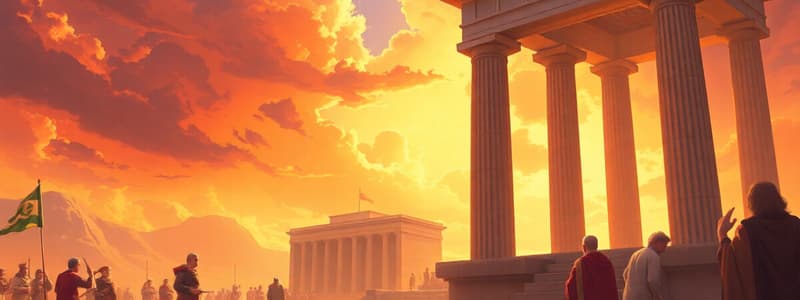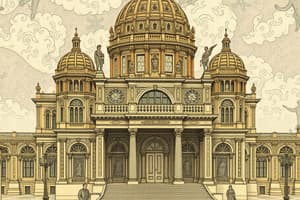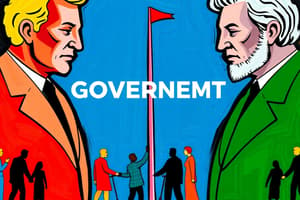Podcast
Questions and Answers
In Plato's progression of regimes, what societal shift primarily distinguishes the transition from aristocracy to timocracy?
In Plato's progression of regimes, what societal shift primarily distinguishes the transition from aristocracy to timocracy?
- A shift from valuing freedom to valuing equality.
- A shift from prioritizing economic stability to prioritizing social justice.
- A shift from emphasizing individual rights to emphasizing collective responsibility.
- A shift from valuing wisdom and virtue to valuing honor and military prowess. (correct)
Which characteristic of a timocratic man is considered a deviation from the values of a philosopher-king in Plato's ideal aristocracy?
Which characteristic of a timocratic man is considered a deviation from the values of a philosopher-king in Plato's ideal aristocracy?
- A lack of intellectual curiosity. (correct)
- An emphasis on obedience and discipline.
- A focus on war and a strong military.
- A love for physical fitness and courage.
What is the primary qualification for political power in an oligarchy, according to Plato?
What is the primary qualification for political power in an oligarchy, according to Plato?
- Popularity.
- Military experience.
- Virtue.
- Wealth. (correct)
What inherent instability does Plato identify within an oligarchy?
What inherent instability does Plato identify within an oligarchy?
According to Plato, what is a significant vulnerability of a democracy that can lead to its downfall?
According to Plato, what is a significant vulnerability of a democracy that can lead to its downfall?
How does the 'democratic man' contribute to the instability of democracy, according to Plato?
How does the 'democratic man' contribute to the instability of democracy, according to Plato?
What is the role of a tyrant immediately after seizing power in a democracy, according to Plato?
What is the role of a tyrant immediately after seizing power in a democracy, according to Plato?
Plato argues that excessive freedom in a democracy ultimately leads to which form of government?
Plato argues that excessive freedom in a democracy ultimately leads to which form of government?
In Plato's view, how does the pursuit of individual freedom in a democracy impact the overall structure and order of society?
In Plato's view, how does the pursuit of individual freedom in a democracy impact the overall structure and order of society?
According to Plato, what is the primary driving force behind the actions and decisions of the 'democratic man'?
According to Plato, what is the primary driving force behind the actions and decisions of the 'democratic man'?
Which of the following best describes Plato's assessment of the qualifications considered important for rulers and officials within a democracy?
Which of the following best describes Plato's assessment of the qualifications considered important for rulers and officials within a democracy?
How does the democratic man's attitude towards values and principles differ from that of individuals in other forms of government, according to Plato?
How does the democratic man's attitude towards values and principles differ from that of individuals in other forms of government, according to Plato?
What is the role of inequality in the transition from oligarchy to democracy?
What is the role of inequality in the transition from oligarchy to democracy?
In what way does the insatiable desire for wealth contribute to the downfall of an oligarchy and the rise of democracy, according to Plato?
In what way does the insatiable desire for wealth contribute to the downfall of an oligarchy and the rise of democracy, according to Plato?
Considering Plato's critique, how might a modern society informed by his concerns about democracy balance individual freedom with the need for social order and competent governance?
Considering Plato's critique, how might a modern society informed by his concerns about democracy balance individual freedom with the need for social order and competent governance?
How does a society's emphasis on 'freedom of speech, thought, and lifestyle' impact its ability to maintain a unified sense of purpose, according to Plato?
How does a society's emphasis on 'freedom of speech, thought, and lifestyle' impact its ability to maintain a unified sense of purpose, according to Plato?
What is the primary driving force behind the actions and decisions of rulers in a timocracy?
What is the primary driving force behind the actions and decisions of rulers in a timocracy?
Which aspect of society might be neglected in a timocracy due to its heavy emphasis on military values?
Which aspect of society might be neglected in a timocracy due to its heavy emphasis on military values?
What personal characteristic is most valued in a timocratic man?
What personal characteristic is most valued in a timocratic man?
According to Plato, what is a key factor that contributes to the transition from aristocracy to timocracy?
According to Plato, what is a key factor that contributes to the transition from aristocracy to timocracy?
What is a potential negative consequence of the ruling class becoming arrogant and domineering in a timocracy?
What is a potential negative consequence of the ruling class becoming arrogant and domineering in a timocracy?
In what way does a timocracy fall short of Plato's ideal of aristocracy?
In what way does a timocracy fall short of Plato's ideal of aristocracy?
What is one way timocratic societies maintain social order and control?
What is one way timocratic societies maintain social order and control?
Which of the following best describes the balance of elements within the soul of a timocratic man, according to Plato?
Which of the following best describes the balance of elements within the soul of a timocratic man, according to Plato?
What is the primary motivation of the timocratic man, influencing his behavior and choices?
What is the primary motivation of the timocratic man, influencing his behavior and choices?
What might be a consequence of the timocratic man's disdain for money and focus on military glory?
What might be a consequence of the timocratic man's disdain for money and focus on military glory?
Flashcards
Plato's Ideal Governance
Plato's Ideal Governance
Ideal government ruled by wise, virtuous philosopher-kings.
Timocracy
Timocracy
Values honor/military strength over wisdom, led by glory-seeking rulers.
Oligarchy
Oligarchy
Wealth determines power; rich rule, poor excluded. Breeds inequality and unrest.
Democracy
Democracy
Signup and view all the flashcards
Tyranny
Tyranny
Signup and view all the flashcards
Timocratic Values
Timocratic Values
Signup and view all the flashcards
Oligarchic Man
Oligarchic Man
Signup and view all the flashcards
Democratic Man
Democratic Man
Signup and view all the flashcards
Origin of Democracy
Origin of Democracy
Signup and view all the flashcards
Core Traits of Democracy
Core Traits of Democracy
Signup and view all the flashcards
Democratic Equality
Democratic Equality
Signup and view all the flashcards
Democratic Society
Democratic Society
Signup and view all the flashcards
Democratic Leadership
Democratic Leadership
Signup and view all the flashcards
Democratic Man's Motivation
Democratic Man's Motivation
Signup and view all the flashcards
Weaknesses of the Democratic Man
Weaknesses of the Democratic Man
Signup and view all the flashcards
Life of the Democratic Man
Life of the Democratic Man
Signup and view all the flashcards
Democratic Soul
Democratic Soul
Signup and view all the flashcards
Democracy's Authority Problem
Democracy's Authority Problem
Signup and view all the flashcards
Demagoguery in Democracy
Demagoguery in Democracy
Signup and view all the flashcards
Democracy's Downfall
Democracy's Downfall
Signup and view all the flashcards
Timocracy's Values
Timocracy's Values
Signup and view all the flashcards
Aristocracy to Timocracy
Aristocracy to Timocracy
Signup and view all the flashcards
The Timocratic Man
The Timocratic Man
Signup and view all the flashcards
Timocratic Soul
Timocratic Soul
Signup and view all the flashcards
Timocracy's Flaws
Timocracy's Flaws
Signup and view all the flashcards
Timocracy's Imperfection
Timocracy's Imperfection
Signup and view all the flashcards
Study Notes
- Plato's Republic explores ideal governance and different government types.
- Plato advocates for philosopher-kings with wisdom and virtue as rulers.
- Plato describes five regimes declining in quality: Aristocracy (ideal), Timocracy, Oligarchy, Democracy, and Tyranny.
- These regimes show a progression of societal and individual decline.
- Plato's analysis of democracy and the democratic character is in Book VIII of The Republic.
- Plato critiques democracy as a flawed political system, ranking it fourth from best to worst.
Timocracy
- Timocracy arises when aristocratic society values honor and military power over wisdom and justice.
- Timocracy rulers are motivated by honor and military glory.
- Timocracy focuses on war and a strong military.
- The timocratic man values fitness, courage, and obedience, but lacks intellectual curiosity.
- Timocracy deviates from aristocracy because its rulers aren't philosophers and prioritize honor over wisdom.
- Timocracy society begins to value wealth, leading to oligarchy.
- Timocracy is the second-best regime in Plato's ranking, following aristocracy.
- It arises when the ruling class in aristocracy values honor and military prowess over wisdom and virtue.
- Timocracy focuses on military strength, discipline, and obedience to authority.
- The ruling class consists of warriors and soldiers motivated by a desire for honor and glory.
- These rulers value physical fitness, courage, and skill in warfare.
- Timocratic societies are strict and regimented, emphasizing military training and discipline.
- Citizens are expected to be loyal, obedient, and willing to sacrifice their own interests for the state.
Transition from Aristocracy to Timocracy
- Transition from aristocracy to timocracy occurs when the guardians (ruling class) in aristocracy become corrupted by ambition and a desire for personal glory.
- Instead of prioritizing wisdom and virtue, they begin to value honor and military success.
- A decline in the quality of the ruling class and a shift in the values of society as a whole then occurs.
- Timocracy represents a departure from the ideal of philosopher-kings and a move towards a more militaristic and authoritarian form of government.
- The guardians are no longer motivated by a love of wisdom but rather by a desire for honor and recognition.
Characteristics of the Timocratic Man
- The timocratic man embodies the values and characteristics of a timocratic society.
- He is motivated by a desire for honor, recognition, and military success.
- This man values courage, discipline, and obedience to authority and is willing to sacrifice personal interests for the sake of the state.
- The timocratic man despises money and is concerned with military glory.
- The timocratic man's soul is characterized by a balance between reason and spirit, with the spirited part dominating.
- He is driven by a desire for achievement and recognition, and is willing to work hard and make sacrifices to attain these goals.
Flaws of Timocracy
- Timocracy's emphasis on honor and military strength can lead to aggression and conflict with other states.
- The ruling class in timocracy may become arrogant and domineering, leading to oppression and injustice.
- The focus on military values can also lead to a neglect of other important aspects of society, such as education, culture, and the pursuit of knowledge.
- Timocracy falls short of aristocracy because it prioritizes honor and military success over wisdom and virtue.
- It represents a decline from the ideal of philosopher-kings and a step towards more flawed and corrupt forms of government.
Oligarchy
- Oligarchy arises when wealth is the main qualification for political power.
- In an oligarchy, the rich rule, excluding the poor from governance.
- Society divides into wealthy few and impoverished many, causing social unrest.
- The oligarchic man desires wealth and is frugal and hardworking to get it.
- Oligarchy is unjust because it prioritizes economic status over virtue and competence.
- Plato finds oligarchy inherently unstable due to division and inequality.
- The insatiable desire for wealth becomes a breeding ground for crime.
Origins of Democracy
- Democracy arises from the excessive pursuit of freedom in oligarchy.
- In an oligarchy, the insatiable desire for wealth leads to a division between the rich and the poor.
- The poor eventually revolt and overthrow the oligarchy, establishing a democratic regime.
- Democracy emerges when the poor recognize the corruption and inequality inherent in the oligarchic system and take control.
Democracy
- Democracy emerges when the poor overthrow the wealthy ruling class.
- Democracy is characterized by freedom and equality where all citizens have a say in government.
- While freedom seems appealing, Plato argues it can lead to excess and disorder.
- The democratic man pursues all desires, not distinguishing between necessary and unnecessary ones.
- The democratic man lacks focus and discipline, leading to constant change and instability.
- Equality emphasis can disregard expertise and respect for authority.
- Plato sees democracy as vulnerable to demagoguery, where leaders manipulate public opinion.
- Excessive freedom eventually leads to tyranny.
Characteristics of Democracy
- Freedom and equality are the defining characteristics of democracy.
- Democratic societies value freedom of speech, thought, and lifestyle, allowing citizens to pursue their desires without restraint.
- Equality is emphasized, with all citizens having an equal say in political matters, regardless of their merit or expertise.
- In a democracy, individuals are free to pursue their own interests and desires without the fear of oppression or discrimination.
- This emphasis on freedom and equality can lead to a lack of structure and order in society.
- Democratic societies are characterized by a wide variety of individuals and lifestyles, with no single standard of behavior or belief.
- Democracy is diverse and tolerant, embracing a wide range of opinions and perspectives.
- The democratic constitution is not concerned with the qualifications of rulers and officials, leading to the selection of individuals based on popularity rather than competence.
The Democratic Man
- The democratic man embodies the values and characteristics of a democratic society.
- This man is driven by a desire for freedom and pleasure, indulging in a wide range of activities and desires without restraint.
- He lacks a clear sense of purpose or direction, drifting from one pursuit to another as his desires change.
- The democratic man is tolerant of different lifestyles and opinions but lacks a strong commitment to any particular set of values or principles.
- He is easily swayed by popular opinion and is prone to excess and self-indulgence.
- Such individuals lack discipline and prioritize immediate gratification over long-term goals.
- The life of the democratic man is characterized by a constant pursuit of pleasure and a rejection of traditional values and authority.
- The democratic man's soul is fragmented and disordered, lacking the internal harmony and balance that characterize the virtuous individual.
Critique of Democracy
- Plato criticizes democracy for its inherent instability and susceptibility to factionalism.
- The emphasis on freedom and equality can lead to a lack of respect for authority and expertise.
- In a democratic society, individuals are free to pursue their own interests at the expense of the common good.
- This can result in a society that is chaotic, divided, and lacking in direction.
- Plato argues that democracy is vulnerable to demagoguery, where charismatic leaders manipulate public opinion to gain power.
- These leaders can exploit the people's desires and fears, leading to tyranny and oppression.
- Plato believed that democracy inevitably devolves into tyranny because the pursuit of unlimited freedom leads to chaos and disorder.
- To restore order, the people turn to a strong leader who promises to protect them from the excesses of freedom.
- This leader gradually seizes power and establishes a tyrannical regime.
Comparison to Other Regimes
- Plato ranks democracy as better than tyranny but worse than aristocracy, timocracy, and oligarchy.
- Aristocracy, ruled by philosopher-kings, is the ideal regime, characterized by wisdom, justice, and order.
- Timocracy, ruled by honor-loving individuals, is superior to democracy because it values courage, discipline, and public service.
- Oligarchy, ruled by the wealthy, is better than democracy because it at least values efficiency and economic stability.
- Tyranny, ruled by a single oppressive leader, is the worst regime, characterized by cruelty, injustice, and oppression.
- Democracy is seen as a midpoint between more desirable and less desirable forms of government, embodying both positive and negative qualities.
Tyranny
- Tyranny arises out of democracy when a demagogue gains absolute power.
- The tyrant initially presents as a people's protector but becomes an oppressive ruler.
- Tyranny is the worst government form, as the tyrant rules in self-interest, suppressing freedom.
- The tyrannical man is driven by his most base and irrational desires.
- He is enslaved to his passions and lacks self-control or a moral compass.
- Tyrants are isolated, distrustful, and cruel, guarding against threats to power.
- Plato sees tyranny as the ultimate injustice and unhappiness, for both ruler and ruled.
Studying That Suits You
Use AI to generate personalized quizzes and flashcards to suit your learning preferences.




